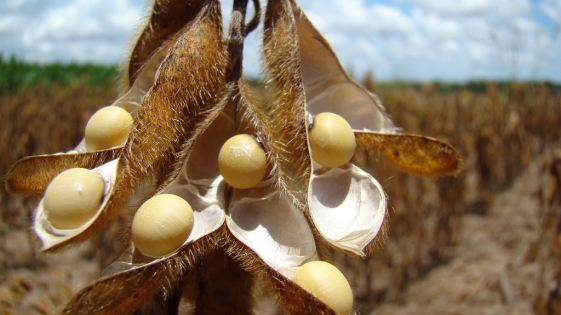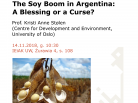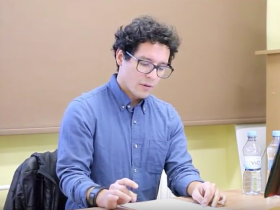The Soy Boom in Argentina: A Blessing or a Curse?

Serdecznie zapraszamy wszystkich zainteresowanych na otwarte seminarium naukowe IEiAK UW i Stowarzyszenia Pracownia Etnograficzna
Prof. Kristi Anne Stølen wygłosi wykład
The Soy Boom in Argentina: A Blessing or a Curse?
Over the last twenty years Argentina has been through a transformation of the agrarian sector, generated by export driven growth, to a large extent based on the new biotechnology associated with gene modified (GM) soy production. This export driven growth strategy was expected to help the Argentine government to reduce poverty and inequality through revenues from export tax on agricultural products, especially soy and its derivatives. The expansion of GM soy was also expected to have positive environmental effects because of savings from reduced pesticide use and reduced soil erosion due to less intensive tilling. In terms of economic growth the Argentina’s transition to GM soy has been a success. However, there seem to be an increasing conflict between the economic success and socio-ecological sustainability.
The impact of the expansion of soy production varies throughout the country according to the agrarian structure and social conditions before the “GMO revolution”. In the pampas, previously dominated by large cattle and grain farms, there has been a change in land use, without major changes in the structure of land ownership. In poor peasant areas, previously unattractive for modern agricultural production until the introduction of GM crops, changes in land tenure and ownership have been dramatic leading to displacement of peasants and increased rural exodus.
In this paper, based on long-standing anthropological fieldwork in Santa Fe province, I will analyse the impact of the expansion of soy in farmer areas previously characterised by mechanised family farms and vigorous rural communities. The impact of the GMO revolution is less far-reaching in the this area compared to other parts of the country, where production no longer is controlled by farmers, but by large commercial companies with limited interest in environment and sustainability. Although there has been a gradual increase in soy cultivation locally, soy has not eradicated other crops and/or livestock as in many other parts of Argentina. Nevertheless, the soy boom has resulted in major economic and social changes in the countryside. The land is producing more than ever, but the vigorous rural communities that I studied in the 1970 and 1980 are dying.
Professor Kristi Anne Stølen is a social anthropologist at the Centre for Development and the Environment at the University of Oslo. She was the director of the Centre from 2007 to July 1 2017. Stølen has written extensively on gender, power and agrarian change based on research in Argentina, Ecuador and Zambia. Another central topic is political conflicts and forced migration, based on fieldwork in Guatemala. Stølen’s current research focuses on the impact of the expansion of new biotechnology and the soy boom in Argentina.The project is part of a longitudinal study of agrarian change among family farmers, started in 1973.
Stølen’s publications include the following books: A media voz: Relaciones de género en la Sierra Ecuatoriana, The Decency of Inequality: Gender, Power and Social Change on the Argentine Prairie and In the Aftermath of Violence: Resilience and Reconstruction among Guatemalan Returnees. She has co-edited: Gender and Social Change in Developing Countries; Machos, Mistresses and Madonnas: Contesting the Power of Latin American Gender Imagery, and In the Maze of Displacement: Migration, Conflict and Change in Developing Countries.
SEMINARIA NAUKOWE IEiAK - w trakcie seminariów badania prezentują pracownicy instytutu, a także antropolodzy i przedstawiciele pokrewnych dyscyplin z kraju i ze świata. To okazja do zapoznania się z najnowszymi badaniami i swobodnej dyskusji w kameralnej atmosferze. Spotkania są otwarte dla publiczności. Serdecznie zapraszamy wszystkich zainteresowanych: zarówno badaczy, jak i studentów, absolwentów oraz wszelkie osoby, którym bliska jest tematyka seminariów. Dowiedz się więcej
Nagrania seminariów
Antropologia dziś - otwarte seminaria naukowe – zadanie finansowane w ramach umowy 973/P-DUN/2018 ze środków Ministra Nauki i Szkolnictwa Wyższego przeznaczonych na działalność upowszechniającą naukę. Projekt jest realizowany przez Stowarzyszenie Pracownia Etnograficzna im. Witolda Dynowskiego we współpracy z Instytutem Etnologii i Antropologii Kulturowej UW.





